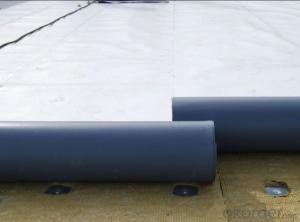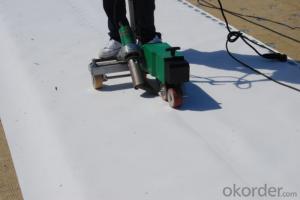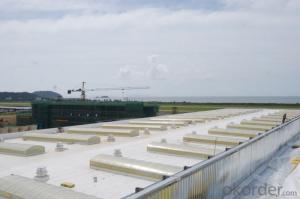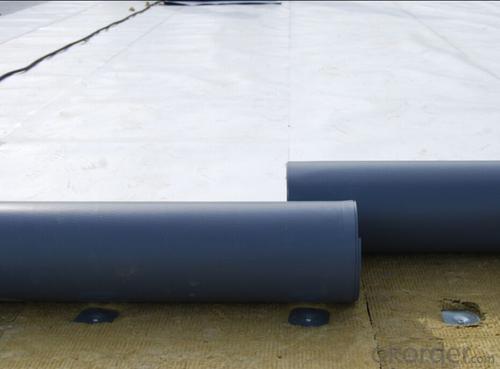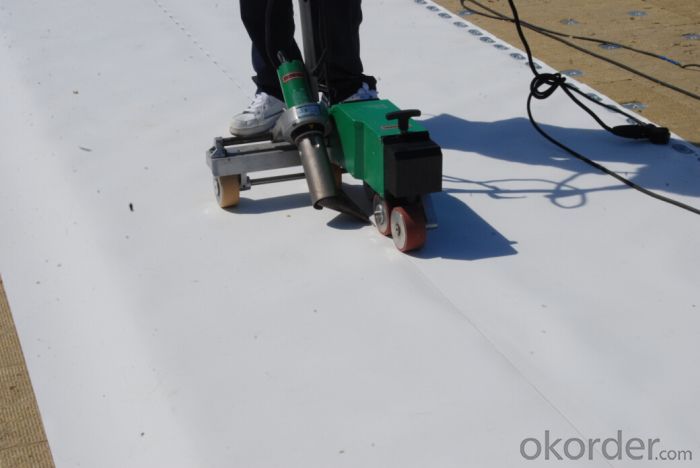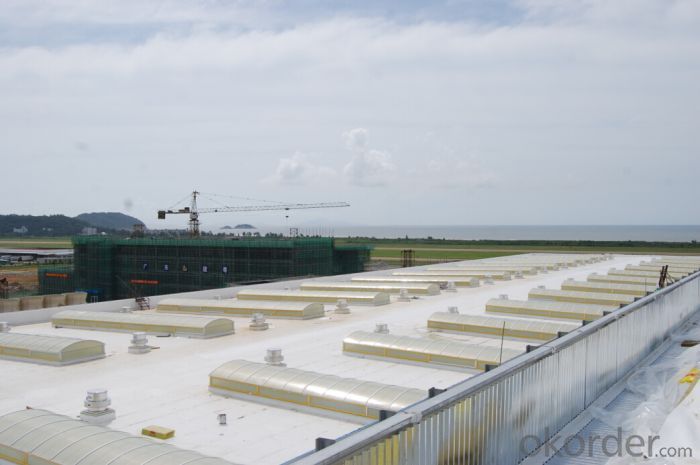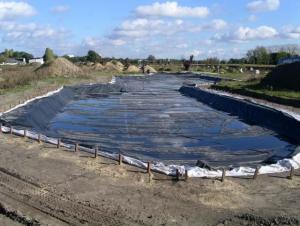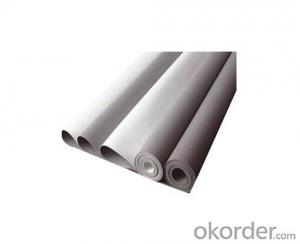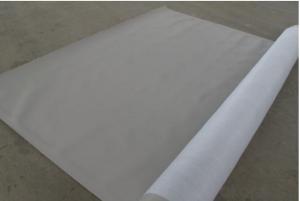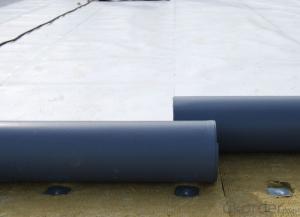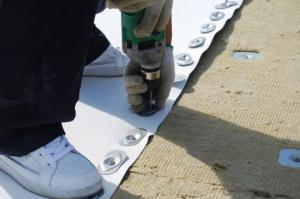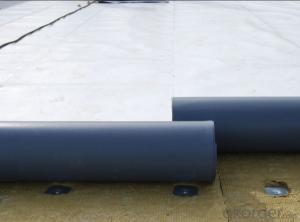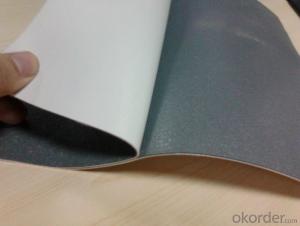TPO Waterproof Roofing Membrane Thickness with 1.8 mm
- Loading Port:
- Qingdao
- Payment Terms:
- TT OR LC
- Min Order Qty:
- 5000 m²
- Supply Capability:
- 10000 m²/month
OKorder Service Pledge
OKorder Financial Service
You Might Also Like
Description Of TPO membrane:
TPO (Thermoplastic Polyolefin) waterproof membrane is typically based on polypropylene and EP (ethylene-propylene) rubber. TPO mainly contains carbon atoms and hydrogen atoms and doesn’t contain any plasticizers and chlorine elements. It is a beautiful, long-lived eco-friendly product. TPO membranes are installed mechanically-attached, fully-adhered or ballasted.
Specification of TPO membrane:
1) Size: 2.05m (width)*20m (length) or customized
2) Thickness: 1.2mm, 1.5mm, 2.0mm
3) Type: Homogeneous; Reinforced with Polyester felt; Fabric backing
4) Color: white/grey or customized
5) Note: exposed type
Product Advantages of TPO membrane:
1. Weather resistance and durability; Excellent weld ability;
2. No any crisp agents to prevent materials brittleness;
3. Intermediate enhanced polyester mesh fabric to have high tensile strength, fatigue resistance and penetrating resistance suitable for mechanically attached roofing systems;
4. Excellent the same high and low temperature resistance as rubber materials which can keep flexible at -50° C and keep mechanical strength in high temperature;
Applications of TPO membrane:
1. Roof construction & steel structure of both industrial and civil engineering
2. Underground engineering, such as subways, tunnels, air Raid shelter, etc.
3. Sewage treatment, dam, reservoir and basement, grain storehouse, etc.
FAQ:
Q: Can I visit your company?
A: Yes, welcome to visit our enterprise.
Q: Can I do the third party testing before loading?
A: Yes, we could accept the third party testing.
Q: Which kind of payment in your company?
A: We could accept TT, LC at sight, etc.
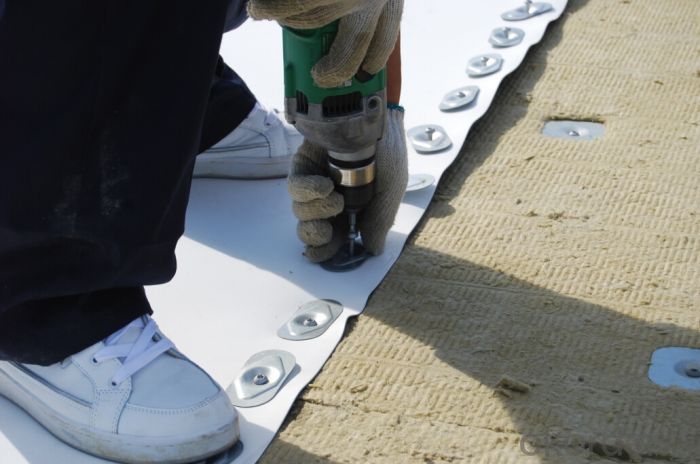
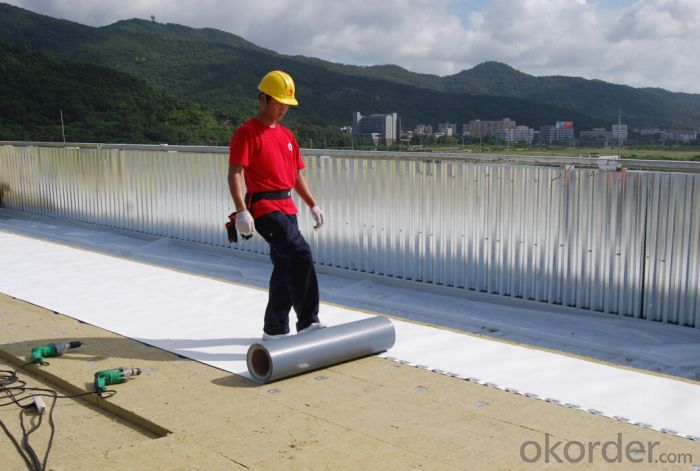
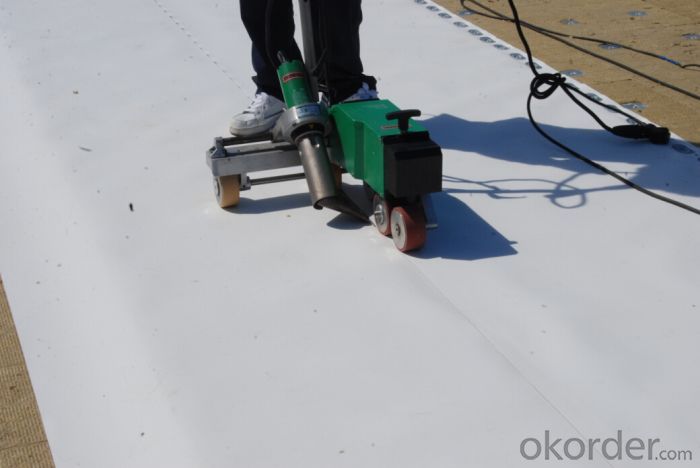
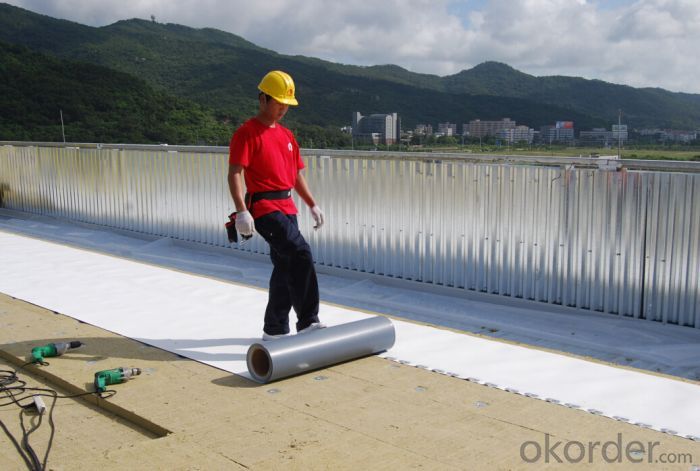
- Q: Can waterproofing membranes be used on concrete tunnels?
- Yes, waterproofing membranes can be used on concrete tunnels. Waterproofing membranes are commonly used in construction to prevent water infiltration and protect structures, including concrete tunnels, from moisture damage. These membranes create a barrier that prevents water from seeping through the concrete and into the tunnel, ensuring its durability and longevity.
- Q: Can a waterproofing membrane be used for retaining walls?
- A waterproofing membrane is suitable for retaining walls as it helps to prevent water from penetrating and causing damage or structural failure. These membranes, made of materials like rubber, PVC, or bituminous compounds, are installed on the inner side of the retaining wall to create a barrier against water infiltration. In addition to protecting the wall's stability, some membranes also offer resistance to root penetration, UV protection, and flexibility to accommodate movement. However, it is crucial to consider factors such as the type of retaining wall, water pressure, and local climate conditions when selecting the right waterproofing membrane. It is advisable to consult with a professional engineer or contractor to ensure the most suitable waterproofing solution for your specific retaining wall project.
- Q: Can waterproofing membranes be used for planter boxes?
- Yes, waterproofing membranes can be used for planter boxes. Waterproofing membranes are designed to prevent water from penetrating surfaces, and can be applied to various materials such as wood, concrete, or metal. By applying a waterproofing membrane to the inside of a planter box, it can help to protect the material from water damage, prolonging the lifespan of the planter box. This is especially beneficial for wooden planter boxes, as the membrane can prevent the wood from rotting or deteriorating over time. Additionally, the waterproofing membrane can help to retain moisture within the planter box, preventing water from seeping out and ensuring that the plants receive sufficient water for healthy growth. Overall, using waterproofing membranes for planter boxes can help to improve their durability and performance, making them a popular choice for both indoor and outdoor gardening.
- Q: Does a waterproofing membrane require any specific safety precautions during installation?
- Specific safety precautions are necessary when installing a waterproofing membrane. Consider the following key precautions: 1. Personal Protective Equipment (PPE): Installers must wear appropriate PPE, such as gloves, safety glasses, and protective clothing, to avoid skin contact with the membrane and potential chemical hazards. 2. Adequate Ventilation: Ensure that the installation area has proper ventilation to prevent the accumulation of fumes or vapors. If working in a confined space, use ventilation systems to eliminate any potentially harmful gases or odors. 3. Hazardous Chemicals: Some waterproofing membranes contain hazardous chemicals or solvents. Installers should carefully read and adhere to the manufacturer's instructions for handling and using these products. Proper storage, handling, and disposal of chemicals are crucial to prevent accidents or environmental contamination. 4. Slips and Falls: The surface can become slippery during installation, particularly when applying the membrane on wet surfaces. Installers should take precautions to maintain stability and utilize safety equipment like harnesses or guardrails when working at heights to prevent falls. 5. Heat Hazards: Proper installation of certain waterproofing membranes requires the use of heat. Installers should exercise caution when working with heat sources such as torches or heat guns to prevent burns or fire hazards. Keep fire extinguishers readily available and ensure that personnel receive adequate training on fire safety protocols. 6. Electrical Safety: Waterproofing membranes might be installed in areas where electrical systems are present. Installers should exercise caution when working near live electrical wires or outlets and adhere to proper electrical safety procedures to prevent electric shocks or fires. It is crucial for installers to undergo comprehensive training and diligently follow all safety guidelines provided by the manufacturer. This will help minimize the risk of accidents, injuries, or property damage during the installation process.
- Q: Can a waterproofing membrane be used on tunnels with seismic protection systems?
- Tunnels equipped with seismic protection systems can indeed benefit from the use of a waterproofing membrane. It is strongly advised to employ such a membrane in order to avoid water infiltration and subsequent harm to the tunnel's integrity. Seismic protection systems are engineered to absorb and dissipate the seismic energy released during an earthquake, guaranteeing the tunnel's safety and stability. However, these systems do not provide any defense against water ingress. By incorporating a waterproofing membrane, the tunnel can be shielded from potential water leaks and seepage, which can result in reinforcement corrosion, concrete deterioration, and overall structural impairment. It is crucial to opt for a waterproofing membrane specifically designed for tunnel use, taking into account qualities such as flexibility, durability, and resistance to seismic-induced movement. Moreover, precise detailing and installation techniques must be employed to ensure a seamless and efficient waterproofing system that complements the tunnel's seismic protection measures.
- Q: Are waterproofing membranes suitable for residential applications?
- Yes, waterproofing membranes are suitable for residential applications. They are commonly used in various areas of residential construction, such as basements, foundations, roofs, bathrooms, and balconies, to prevent water penetration and protect the building structure from moisture damage. Waterproofing membranes provide a barrier against water, preventing it from seeping into the structure and causing issues like mold, rot, or structural damage. These membranes are typically made of materials like bitumen, PVC, EPDM, or polyurethane, which are highly effective in repelling water. In residential constructions, waterproofing membranes are installed during the building process or as a part of renovation projects. They can be applied as a liquid coating or in the form of sheets that are laid down and adhered to the surface. These membranes create a seamless and durable barrier that can withstand the test of time. Additionally, waterproofing membranes offer various benefits for residential applications. They help maintain a dry and comfortable living environment by preventing water leaks and dampness. This, in turn, protects the integrity of the building materials, prolongs the lifespan of the structure, and reduces the risk of costly repairs. Furthermore, waterproofing membranes can also enhance energy efficiency by reducing moisture-related heat loss or gain. By preventing water infiltration, they help maintain consistent temperatures inside the house, resulting in lower energy consumption and utility bills. Overall, waterproofing membranes are an excellent choice for residential applications. They provide reliable protection against water damage, improve the longevity of the structure, and contribute to a healthier and more energy-efficient living environment.
- Q: Can waterproofing membranes be used on concrete countertops?
- Concrete countertops can indeed benefit from the application of waterproofing membranes. These membranes are specially crafted to thwart the infiltration of water and can be utilized on diverse surfaces, including concrete. By opting for a waterproofing membrane on a concrete countertop, one can effectively safeguard it against water harm, staining, and possible structural concerns. Furthermore, these membranes can augment the countertop's resilience and lifespan by averting moisture-induced problems, such as cracking or warping. It is imperative to verify that the selected waterproofing membrane is concrete-compatible and appropriate for countertop use.
- Q: Can waterproofing membranes be used on loading docks?
- Yes, waterproofing membranes can be used on loading docks. Waterproofing membranes are designed to provide a protective barrier against water infiltration, making them suitable for various applications, including loading docks. By installing waterproofing membranes on loading docks, it helps prevent water damage and leakage into the underlying structure, protecting the integrity and durability of the dock. Additionally, waterproofing membranes can also help enhance safety by reducing the risk of slips and falls that can occur due to wet surfaces on loading docks.
- Q: Can a waterproofing membrane be used for plant rooms or mechanical spaces?
- Yes, a waterproofing membrane can be used for plant rooms or mechanical spaces. Plant rooms and mechanical spaces are areas where equipment, machinery, or systems are installed, and they often contain pipes, tanks, or other components that require protection from water damage. A waterproofing membrane is a durable, flexible, and watertight barrier that can be applied to surfaces such as walls, floors, or ceilings to prevent water infiltration. By using a waterproofing membrane in plant rooms or mechanical spaces, you can ensure the longevity and functionality of the equipment and systems by protecting them from water leaks or moisture damage. Additionally, a waterproofing membrane can also provide a vapor barrier, preventing the buildup of condensation or humidity, which can be detrimental to sensitive equipment.
- Q: Can a waterproofing membrane be applied to curved surfaces?
- Yes, a waterproofing membrane can be applied to curved surfaces. Waterproofing membranes are designed to be flexible and can conform to various shapes and contours, including curved surfaces. This allows for effective waterproofing of both flat and curved areas, providing protection against water infiltration.
Send your message to us
TPO Waterproof Roofing Membrane Thickness with 1.8 mm
- Loading Port:
- Qingdao
- Payment Terms:
- TT OR LC
- Min Order Qty:
- 5000 m²
- Supply Capability:
- 10000 m²/month
OKorder Service Pledge
OKorder Financial Service
Similar products
Hot products
Hot Searches
Related keywords
